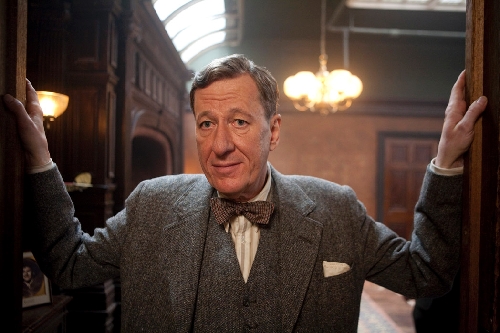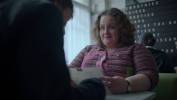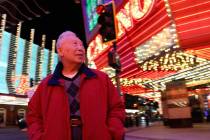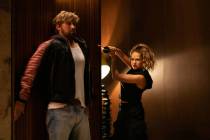Characters share common ground in “The King’s Speech”


Exceptional performances? To be sure.
Exceptional movie? Not quite.
Not that “The King’s Speech” (opening here Christmas Day) isn’t a perfectly fine movie, a handsome and well-mannered period piece focusing on an unusual — and highly unlikely — friendship.
Think of it as a more dramatic, upper-crust variation on that old cinematic favorite, the odd-couple buddy comedy.
After all, who could be more mismatched than a British royal and a quirky commoner (an Australian, to boot) with the temerity to address His Highness by his first name?
Yes, that’s the setup — and it’s all true. Or enough of it to make “The King’s Speech” another of the fact-based cinematic tales so beloved by filmmakers (and audiences) these days.
With stars Colin Firth and Geoffrey Rush leading an all-star acting ensemble, the movie boasts a cast that’s always worth watching — even if the movie doesn’t always prove as worthy of attention as they are.
The naturally aristocratic Firth, naturally, portrays Albert Frederick Arthur George — Britain’s future King George VI, father of the currently reigning Queen Elizabeth II.
When the movie opens, in 1925, Albert’s father George V (Michael Gambon) is still on the throne, with feckless Edward (Guy Pearce), the Prince of Wales, his heir.
Albert — Bertie to his family — is the Duke of York, second in line for the crown, dutifully resigned to his role as royal representative at all manner of official events.
If only he didn’t have to make speeches.
Thanks to the radio, King George’s subjects can now hear their sovereign and his family members speak for themselves.
“In the past, all a king had to do was wear a uniform and not fall off his horse,” Bertie’s father observes. With radio added to the regal duty list, however, “We’ve become actors!”
Easy for him to say — he doesn’t have an uncontrollable stammer, like Bertie, who can barely utter two words in public without torment. And, despite extensive expert treatment, His Royal Highness shows no signs of change, let alone improvement.
Little wonder, then, that Bertie’s wife Elizabeth (a sprightly Helena Bonham Carter) — better known to us Yanks as the Queen Mum, Queen Elizabeth’s mother — seeks an unorthodox alternative.
His name is Lionel Logue (Geoffrey Rush), an eccentric Australian who dreams of being an actor — but scrapes by teaching elocution and dispensing his own distinctive, highly idiosyncratic brand of speech therapy.
For one thing, Lionel refuses to pay any attention whatsoever to the way things are (and have always been) done, insisting on treating every patient equally — and being on a first-name basis with every one of them. Which makes him Lionel — and the Duke of York just plain Bertie.
Aghast at this cheeky breach of protocol, Bertie resists Lionel’s efforts. Until they start to work, challenging Bertie’s calcified notions of propriety — and his assumption that there was nothing to be done about his stammer but suffer in agonized silence.
Screenwriter David Seidler (“Tucker: The Man and His Dream”) also has been suffering in silence for some time; a stutterer himself, he researched and planned this project for years, but held off — reportedly at the Queen Mum’s request — until her death, at 101, in 2002.
Little wonder, then, that the give-and-take between Bertie’s regal reserve and Lionel’s irrepressible irreverence represents the heart (and the point) of “The King’s Speech.”
It’s hardly a surprise to report that Firth and Rush rise to the occasion with undeniable flair — and a good deal more emotion than you might expect.
Firth, of course, is a past master at playing this sort of thing, blending surface control and inner turmoil with palpable anguish. (Those who saw his subtly spellbinding work in last year’s “A Single Man” will attest to his power.) With this role, he’s also got the chance to stammer and sputter and show off his technical expertise. Of such stuff are Oscar victories made.
Just ask Rush, an Oscar-winner for such a role in “Shine.” This time, however, Rush isn’t the tormented protagonist; he’s the loving, giving teacher, impudent yet determined to break through Bertie’s regal surface to reach the frightened little boy who’s still inside.
Director Tom Hooper (HBO’s “John Adams”) wisely keeps the focus on these two, despite some vivid supporting turns, notably from Bonham Carter, who gives the future queen a welcome spark. (I also enjoyed seeing that grand thespian Derek Jacobi — whose title-role turn in “I, Claudius” may be the greatest stuttering performance in TV history– as the silver-tongued Archbishop of Canterbury.)
Yet there’s a dignified restraint throughout “The King’s Speech” that occasionally borders on the calcified. Hooper often stages the movie’s action in stagnant, theatrical style, placing his protagonists in representative settings — Bertie’s plush royal realm vs. Lionel’s shabby, yet cozy, surroundings — and then cutting between them, as if we were in the theater. (Or at a tennis match.)
The back-and-forth approach underlines — and overstates — the obvious. Yes, Bertie and Lionel may be from different worlds, but even a king and a commoner can find common ground when they concentrate on the simple human truths they share.
Contact movie critic Carol Cling at ccling@reviewjournal.com or 702-383-0272.
Carol Cling’s movie minuteReview
“The King’s Speech”
118 minutes
R; profanity
Grade: B
opens Saturday at multiple locations
Deja View
British sovereigns have inspired plenty of award-winning historical dramas, including these favorites:
“The Private Life of Henry VIII” (1933) — Charles Laughton’s Oscar-winning portrayal of the much-married monarch powers this handsome epic featuring Robert Donat, Merle Oberon and Elsa Lanchester (Laughton’s wife).
“The Madness of King George” (1994) — Britain’s King George III (Nigel Hawthorne) takes ill, showing signs of dementia, setting the stage for court intrigue and a plot by his ne’er-do-well son (Rupert Everett) to usurp the throne.
“Mrs. Brown” (1997) — In mourning for years, the widowed Queen Victoria (Judi Dench) remains in seclusion — until her late husband’s trusted horseman (Billy Connolly) revives her interest in life.
“Elizabeth” (1998) — Following in the footsteps of (among others) Bette Davis, Jean Simmons and Glenda Jackson, Cate Blanchett makes the role of Queen Elizabeth I her own in this Oscar-winning drama co-starring Joseph Fiennes and Geoffrey Rush.
“The Queen” (2006) — Queen Elizabeth II (Helen Mirren) clashes with new prime minister Tony Blair (Michael Sheen) in the wake of Princess Diana’s sudden death.
— By CAROL CLING


















